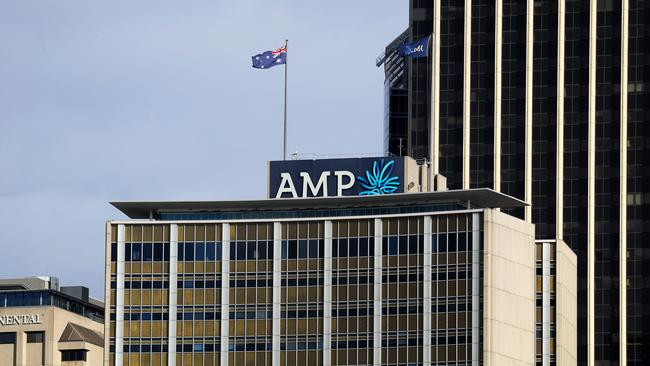AMP, big banks fly high after dodging a banking royal commission bullet
Shares in AMP and the big banks have surged as analysts note the sector has largely dodged a banking inquiry bullet.

Shares in AMP and the big four banks have surged as traders eyed the sector largely dodging a bullet in the wake of the Hayne royal commission’s final report, with banking analysts noting the findings were not as severe as expected. However, the listed mortgage brokers have been slammed after a ban on lender-paid commissions.
At 11.50am (AEDT) AMP (AMP) was up almost 10 per cent at $2.42 after Commissioner Kenneth Hayne’s final blueprint for the sector stopped short of calling for the separation of companies that manufacture and sell wealth and other financial products, known as “vertical integration”. AMP shares had struck a record low of $2.145 yesterday amid last minute jitters about the report.
Similarly, shares of the nation’s biggest bank, CBA, were up 4.72 per cent at $73.62 after the royal commission made no recommendations for banks required capital.
Among other major banks, NAB was up 4.64 per cent at $25.145, ANZ was up 6.15 per cent at $26.77 and Westpac rose 6.76 per cent to $26.55.
But mortgage brokers were under extreme selling pressure.
Mortgage Choice is down 25 per cent at $0.785, Australian Financial Group was down almost 30 per cent at $0.895, and Goldfields Money dived 7.7 per cent to $0.72 a share.
Traders said there was a lot of short covering of bank shares in the market this morning.
Short positions in the major banks had tripled during the course of the royal commission as traders bet on share price declines.
The report did, however, make the prospect of legal action very real for a long list of banks, insurers and wealth groups. There is potential for criminal charges against three institutions for dishonesty, two as a result of the commission and one being considered by the corporate regulator.
Mr Hayne also referred 15 named entities back to the sector’s regulators, the Australian Securities and Investments Commission and the Australian Prudential Regulation Authority, for further investigation. These include three of the big four — ANZ Bank, Commonwealth Bank and National Australia Bank — along with royal commission targets AMP and IOOF.
Credit Suisse analysts said the final Hayne report was more positive for the big banks than anticipated, suggesting they would also benefit from reforms banning mortgage broking commissions.
“Looking through our three lenses of remediation, regulation and remuneration, the final report
contains little in the way of surprises versus expectations and is perhaps more positive than expected (or less negative),” they said. “On the positive side, the recommendation around the removal of broker trail commissions was forth coming, but in addition, the commission recommends that the borrower pays the broker not the lender in order to remove conflict of interest (the
treasurer does not accept that the borrower should pay).
“Time frame for adjustment is two to three years. We have estimated the removal of trail will benefit sector profitability subject to the level of the upfront fee.”
Deutsche Bank analysts labelled the royal commissions findings “nothing radical”.
“Indeed it’s quite practical but some may say too docile. Hayne recommends the law be applied and enforced in accordance with its underlying principles,” they said. “The final report suggests that regulators must change their approach to enforcement, and remuneration must evolve to ensure that culture and governance march together.”
Mr Hayne’s recommendations didn’t include sweeping changes to banks’ responsible lending obligations, pay structures or additional scrutiny of a borrower’s ability to repay their loan. Instead, Mr Hayne wants the current regime better enforced and monitored.
He also called for the banking regulator to include pay structures in its regulatory net, rather than recommending any notable change to remuneration.
UBS analysts don’t expect the Hayne recommendations will have a big impact on the major banks.
“The much anticipated release of the Royal Commission Final Report was disappointing, in our view,” they said. “There was much discussion around misconduct within the banks and the need to change culture; however, the final recommendations fell well short of market expectations.
“It is possible that the banks may face criminal proceedings, but we do not believe that any of the 76 recommendations by themselves will have a material financial impact on the banks.”
Macquarie Group analysts had a similar view tipping the rally of bank stocks on the back of Hayne’s report.
“Following a tumultuous year for the financial services industry, the recommendations from the Commissioner were arguably not as intrusive as currently implied by stock valuations,” they said. “Except for the mortgage broking industry, we believe the majority of recommendations are marginally better than the conservative market’s expectations, and we expect valuation discounts related to adverse outcomes from the royal commission to partially unwind.”
Similarly, Citi analyst Brendan Sproules said the major banks breathe can “breathe a sigh of relief.”
“Despite a year of high drama, evidence of widespread greed, as well as a blistering Interim Report, the Hayne Royal Commission delivered a very pragmatic Final Report,” he said.
“It avoided a radical industry overhaul, as well as avoiding widespread civil and criminal prosecutions. We expect the negative sentiment that has engulfed the sector to wane over 2019, presenting an opportunity for investors.”
Australian Treasurer Josh Frydenberg said the Government will action all 76 recommendations, and the Opposition has also recommitted to adopting all recommendations if elected.




To join the conversation, please log in. Don't have an account? Register
Join the conversation, you are commenting as Logout